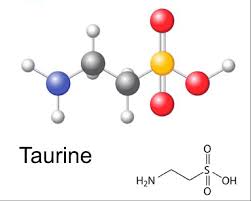Taurine is a type of amino acid called amino sulphonic acid. It plays some important roles in the body and is contained in some foods like fish, eggs, and meat. The body also produces enough of it to meet your needs, and it is concentrated in the eyes, brain, heart and muscles. However, taurine is available as a supplement for people with additional needs, especially newborn babies who depend on taurine supply from breast milk.
Naturally, taurine helps support nerve growth, maintains proper hydration and electrolyte balance, lowers blood pressure, regulates minerals within the cell and calms the nervous system. It can also prevent heart failure from becoming worse. However, the supplement is also used to aid the treatment of diabetes, hepatitis, obesity, fatigue, and many other conditions, and it has been said to help boost an athlete’s performance.
Dosage
In several studies, taurine has been used in doses of 1 to 6 grams daily; the recommended doses for different conditions include:
- High blood sugar: 1.5 g in 3 doses per day.
- Chronic hepatitis: 2 g in 3 doses per day.
- Hypertension: 3 g to 6 g per day for 1 to 8 weeks.
- Portal hypertension 6 grams per day for 4 weeks.
Before taking this supplement for any medical condition, speak with your doctor about it and confirm the dose and duration of your treatment.
Side Effects of Taurine
There have not been any reports of side effects from taurine supplements when used appropriately.
Precautions
When taurine is consumed in foods, it is safe, and when used as a supplement, it can be safe for up to 3 months.
There isn’t enough information to know whether the supplement is safe for pregnant women and breastfeeding mothers, so it is advisable to stick to the normal amount consumed in food and produced by the body naturally. But if you need to take the supplement, you must seek your doctor’s recommendation and dosage.



